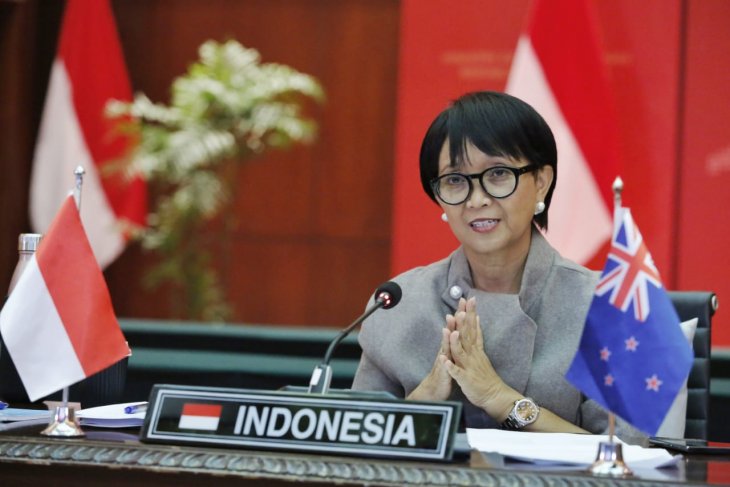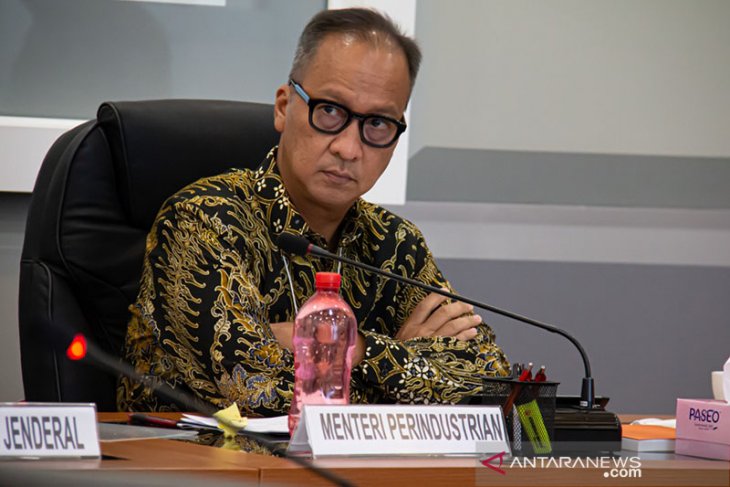Live Streaming
Program Highlight
Company Profile
July
Indonesia and New Zealand Discuss Handling COVID-19 Impacts
Written by Ani Hasanah
Minister of Foreign Affairs Retno Marsudi (Handout Kemlu RI)
Indonesian Foreign Affairs Minister Retno Marsudi and her counterpart from New Zealand, Winston Peters, engaged in a virtual Joint Commission Meeting (JCM) to discuss cooperation in handling the impacts of the COVID-19 pandemic.
"New Zealand is one of the countries to have cooperated with Indonesia during the pandemic," Marsudi remarked after the virtual meeting on Wednesday.
Of New Zealand's total pledge of 6.12 billion New Zealand dollars (equivalent to Rp59.4 billion) towards the cooperation, Rp6.3 billion is allotted to the Eijkman Molecular Biology Institute for improving COVID-19 test services and Rp4.5 billion for other purposes.
Furthermore, Rp.48.6 billion is diverted through the United Nations Children's Fund (UNICEF) to improve risk communication services to the community, the supply and distribution of personal protective equipment, cleaning equipment, and infection prevention measures, as well as to boost the readiness of other critical services.
At the meeting, Indonesia and New Zealand concurred on an Action Plan for 2020-2024 that took into account a new situation since the impacts of COVID-19 are estimated to protract for a long term.
"Several aspects are contained in the Action Plan for the commitment of the two countries in pandemic mitigation and post-pandemic economic recovery, where both stress the importance of global solidarity to deal with this situation," Marsudi emphasized.
In the national context, Foreign Minister Marsudi also elaborated on four key areas of diplomacy and implementation of Indonesia's foreign policy during the pandemic: the protection of Indonesian citizens, procurement of medical equipment, procurement of drugs and vaccines, and economic cooperation.
"I convey to the foreign minister of New Zealand about the vaccine. We discuss the extent of the cooperation we have with other countries and nationally in the context of procuring vaccines for the people of Indonesia," he remarked.
New Zealand is viewed as one of the nations to have succeeded in trouncing over the novel coronavirus disease pandemic by imposing a regional quarantine policy quite early on and backed by its test and tracking capacity, as well as the community’s adherence to health protocols.
As of Thursday, July 29, 2020, New Zealand had recorded 1,559 cases of COVID-19, with 22 deaths, according to data of the Worldometer statistical agency.
Until Wednesday, July 28, 2020, the Indonesian government had confirmed 102,051 cases, with 4,901 having succumbed to COVID-19. (ANTARA)
RRI Receives Intellectual Property Rights for Bye Corona Song
Written by Ani HasanahJakarta (VOI News) - Radio Republik Indonesia (RRI) received the Intellectual Property Rights (IPR) for Bye Corona song from the Regional Office of the Ministry of Law and Human Rights of Jakarta, Wednesday (29/07/2020). RRI’s Program and Production Director, Soleman Yusuf appreciated the intellectual property rights. He said that the Bye Corona was the second recording after Butir-Butir Pasir di Laut or the Sand Grains in the Sea drama which received the same rights. He added that RRI will continue to provide other intellectual property to the public. In addition to RRI, the Jakarta Ministry of Law and Human Rights also provided other intellectual works such as traditional culture of rebana hadroh, Betawi Zapin dance, Cingkrik Silat and Silat Tiga Berantai martial arts. (rri.co.id)
July
Ministry Prepares Road Map for 35-Percent Import Substitution
Written by Nouvarah Ahdiba
The Ministry of Industry (Kemenperin) is preparing a road map to reach the target for 35-percent import substitution this year to reduce import dependency on capital goods and raw materials.
The move is also aimed at completing the industrial structure in the country.
"We are in the process of formulating a road map for the import substitution program. The output and outcome will be import substitution, which we are striving to reach 35 percent by 2022," Minister of Industry, Agus Gumiwang Kartasasmita, said in a statement received in Jakarta on Wednesday.
Under the program, measures are being taken to implement import substitution in industries that recorded large import values in 2019.
They include machinery, chemical, metal, electronics, food, electrical equipment, textiles, motor vehicles, metal goods, and rubber and rubber goods industries.
“This (import substitution) is what we will handle through various policies. We believe this effort will encourage the deepening of the industrial structure, increase investment, and promote the absorption of new workers," the minister said.
To achieve the import substitution target of 35 percent in 2020, the Industry Ministry has taken steps to increase production utilization of all manufacturing industry sectors, with a target of gradually increasing it by 60 percent, 75 percent, and 85 percent in 2020, 2021, and 2022.
The Minister of Industry has revealed that the utilization of the industrial sector before the COVID-19 pandemic struck had reached 75 percent.
With the pressure caused by the pandemic, however, the utilization has fallen dramatically to 40 percent at the moment, according to the ministry.
With several efforts made to reduce the impact of COVID-19 on the industry, the current average utilization of the manufacturing industry sector has slowly started rising towards the 50-percent mark.
"Therefore, we will do our best to encourage the increase of utilization. The chain impact of optimal industrial activity will have a positive impact on labor conditions, increase the people's purchasing power, and increase the export market," Kartasasmita explained.
The government has also applied import control instruments, including limited prohibitions, imposition of pre-shipment inspections, and port management in eastern Indonesia, an entry point for preferred commodities.
"The effort is expected to reduce the entry of imported goods that are flooding Indonesia," the minister stated.
Other instruments include revamping the product certification body for the issuance of the Indonesian National Standard (SNI), implementing mandatory SNI, returning the rules of inspection of imported products from post-border to border, raising the Most Favored Nation (MFN) tariff for strategic commodities, and increasing the implementation of trade remedies.
"Compared to other countries, Indonesia only applies safeguards for 102 types of products and anti-dumping for 48 products, meaning that imported products still can easily enter Indonesia," Kartasasmita added.
The use of various instruments requires the support of various stakeholders, both from the industry and from government ministries and institutions, he said.
The Ministry of Industry is also encouraging increased domestic consumption to help boost demand.
"Because if the demand grows, the industry will also grow," the minister explained.
In addition, the Ministry of Industry has taken several efforts to develop the small and medium industry sector (SMI), including facilitating the absorption of raw materials for SMIs, optimizing the People's Business Credit (KUR) for all sectors, running a Proudly Indonesian Made campaign, and encouraging the implementation of the P3DN program.
"For this reason (to boost demand), we are continuing to urge ministries, institutions, SOEs and other parties to use domestic products," the minister said. (Antara)
July
President Jokowi Signs Regulation to Protect Child Victims, Witnesses of Crime
Written by Ani Hasanah
Dini Shanti Purwono, presidential spokesperson for legal affairs (twitter)
Indonesian President Joko Widodo has signed a regulation to protect the rights of children who have been subject to or witnessed a crime.
The Presidential Regulation Number 75 Year 2020 concerning the Implementation of the Rights of Child Victims and Child Witnesses of Criminal Offenses entitles child victims and witnesses to medical rehabilitation, social rehabilitation, and guarantees their physical, mental, and social safety.
It also grants them the right to access information about developments in the case.
The Presidential Regulation, which was issued on July 6, 2020, is a direct mandate from Law Number 11 of 2012 concerning the Juvenile Justice System, Dini Shanti Purwono, presidential spokesperson for legal affairs, said in Jakarta on Tuesday.
"In Presidential Regulation Number 75/2020, the President reiterates that every Indonesian child, especially a child who is a victim of a crime (child victim) and a child who is a witness of a criminal act (child witness) has the right to have a sense of security in line with the law," Dini informed.
"With Presidential Regulation Number 75/2020, the President makes sure the presence of the state by guaranteeing the safety of child victims and witnesses, protecting their personal security as well as the security of their families and property," the spokesperson remarked.
The results of a national survey on Indonesian children in 2018 had showed that 67 percent, or two out of three children and teenagers aged between 13 and 17 years had experienced emotional, physical, or sexual violence in their lifetime.
The Commission for Protection of Indonesian Children (KPAI) had stated that the number of child abuse cases reached 2,178 in 2011 and rose further to 4,885 cases in 2018.
Data from the Online Information System for the Protection of Women and Children (SIMFONI PPA) showed a total of 3,928 cases of violence against children between January 1 and June 17, 2020, which included 852 cases of physical violence, 768 cases of psychological abuse, and 1,848 cases of sexual violence.
In addition, news surfaced in June this year of the Jakarta Metro Police's Criminal Investigation Unit arresting Francois Abello Camille (FAC), alias Frans, 65, at a hotel in Jakarta. Police officials said they found two underage girls in his room.
The French citizen allegedly molested at least 305 Indonesian minors. He later died in a police hospital after attempting suicide while in detention in Jakarta. (ANTARA)



